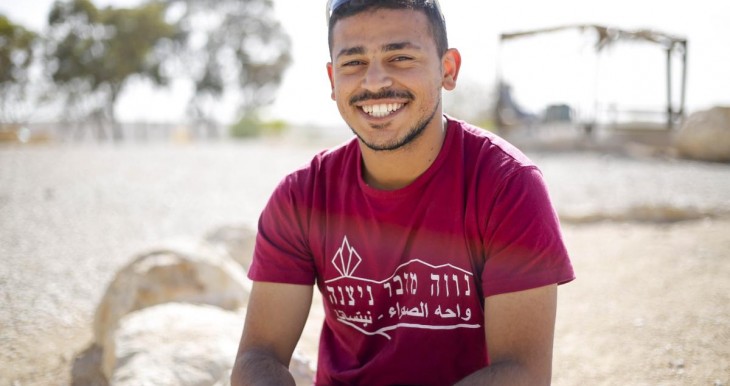Tamer recently received the Israeli President’s Award for Volunteering for his work to save lives in the Negev desert.
“I am here as a group educator in Nitzana, and this role gives me all the options and tools to choose a better life,” he says. “My vision is to help build a generation that creates and doesn't just consume; a generation that benefits society and does not burden society.”
At Nitzana, young people of all backgrounds come together for educational experiences that emphasize tolerance, mutual understanding, and respect for themselves, each other, and the natural world. Situated in the western Negev, Nitzana boasts a “solar park” with scientific installations that are used to educate thousands of schoolchildren and teens each year about renewable energy, along with experiential education about the ecology and resources of the Negev. In 2017, Nitzana served more than 17,000 participants in its various programs, including nearly 200 young long-term residents on programs such as Masa Israel Journey, the Neve Midbar youth village for Bedouin boys, and Israeli service-year volunteers.
Nitzana has a secondary school, an agricultural farm, and a youth village. The village empowers its participants and strengthens their sense of belonging to Israeli society. Its staff includes both Jewish and Arab educators.
“When I arrived in Nitzana, I was pleasantly surprised when I found out that I was taught very seriously,” says Muhammad Kamlat, 16, a member of a Bedouin tribe from Rahat, who explains that the teachers he had encountered until now did not take their educational task seriously.
Tamer was also born in Rahat, and he estimates that his family has been living in the Negev for 200 years. At Nitzana, he oversees the village’s 11th graders and has been a key contributor to Desert Stars, a Bedouin leadership development program.
“Every chapter in a person’s life has a dream that accompanies it,” Tamer says, identifying his current dream as making Bedouin society more socially and economically active in Israel.
Tamer studied at the Ahad High School in Kfar Hura, a special academy for gifted Bedouin in the Negev. As part of a scientific leadership youth movement, he was trained to teach science to young students.
“At that time, when I was trained to be a young instructor, I was an athlete at the end of the 11th grade,” he recalls. “Two representatives of the Desert Stars organization came to tell us that we must act in order to have a better starting point in life, and that is why we must work together. At the end of the meeting, I said that I wanted to be a person with a better starting point. People came to us and presented the reality I really wanted. Their character, the way they explained it, and how they presented the issue of living together, and how I wanted to be, prompted me to move forward.”
As a member of Desert Stars, Tamer says he “acquired a lot of skills and matured, and I began to look at the larger picture, and I understood the complexities of our lives as Bedouin.”
Jamal Majadele, a teacher in Nitzana, says he had “looked for a place where I could contribute, and The Jewish Agency and Nitzana changed ways of thinking about disadvantaged populations and Arab society, so I could connect with them.”
“The Bedouin towns have no facilities for informal studies, and most of the time Bedouin youths wander and spend their time in a way that is inefficient and unwise,” Jamal says. “Then they come to Nitzana and find a framework that embraces them, directs them, and gives them a plan. The studies develop responsible young adults who can lead. They will be agents of change in their society, and this is necessitated by the reality of their life.”
He adds, “The moment you help create a resident, a citizen, no matter who he is, he feels a sense of belonging and loyalty and feels committed to his environment, and has also acquired tools and insights.”
Learn more about Nitzana >
-
This article was originally reported by Nathan Roi for The Jewish Agency for Israel



 0
0


